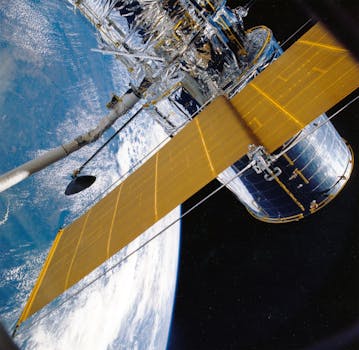
Introduction to the Future of Satellites
The future of satellites is revolutionizing the way we communicate, explore space, and understand our planet. With the increasing demand for global connectivity, satellite technology is playing a vital role in bridging the gap between remote and underserved communities. The future of satellites is not just about launching more satellites into orbit, but about creating a network of interconnected systems that can provide seamless communication, navigation, and Earth observation services. The future of satellites is rapidly evolving, with advancements in technology and innovation driving new opportunities for global communication, space exploration, and Earth observation.
Satellite technology has come a long way since the launch of the first artificial satellite, Sputnik, in 1957. Today, there are thousands of satellites in orbit around the Earth, providing a wide range of services, including television broadcasting, telecommunications, navigation, and Earth observation. The future of satellites is expected to be shaped by advancements in areas such as satellite manufacturing, launch technology, and ground systems.
Advances in Satellite Technology
One of the key drivers of the future of satellites is the advancement in satellite technology. New materials and manufacturing techniques are enabling the production of smaller, lighter, and more efficient satellites. This is leading to a significant reduction in the cost of launching satellites into orbit, making it more accessible for new players to enter the market. Additionally, advancements in propulsion systems and power generation are enabling satellites to operate for longer periods and travel farther distances.
The use of artificial intelligence and machine learning is also transforming the future of satellites. These technologies are being used to improve the performance and efficiency of satellites, as well as to enable new applications such as autonomous navigation and real-time data processing. Furthermore, the integration of satellites with other technologies, such as the Internet of Things (IoT) and 5G networks, is creating new opportunities for innovation and growth.
Applications of Satellites in the Future
The future of satellites will be shaped by a wide range of applications, including global communication, space exploration, and Earth observation. Satellites will play a critical role in providing connectivity to remote and underserved communities, as well as enabling the deployment of IoT devices and 5G networks. In addition, satellites will be used to study the Earth’s climate, monitor natural disasters, and track the movement of people and goods.
The use of satellites in space exploration is also expected to increase, with plans to return humans to the Moon and send missions to Mars. Satellites will be used to provide communication and navigation services for these missions, as well as to study the environment and resources of other planets. Furthermore, the future of satellites will be shaped by the growth of the space tourism industry, with satellites being used to provide services such as satellite-based internet and entertainment.
Challenges and Opportunities in the Future of Satellites
While the future of satellites holds much promise, there are also challenges that need to be addressed. One of the key challenges is the increasing amount of space debris in Earth’s orbit, which poses a risk to the operation of satellites and other space-based systems. Additionally, the future of satellites will be shaped by regulatory frameworks and international agreements, which will need to be updated to reflect the changing nature of the industry.
Despite these challenges, the future of satellites presents many opportunities for innovation and growth. The development of new technologies and applications will create new markets and industries, and the use of satellites will continue to transform the way we communicate, explore space, and understand our planet. As the industry continues to evolve, it is likely that we will see new players enter the market, and new partnerships and collaborations will be formed to drive innovation and advancement.






